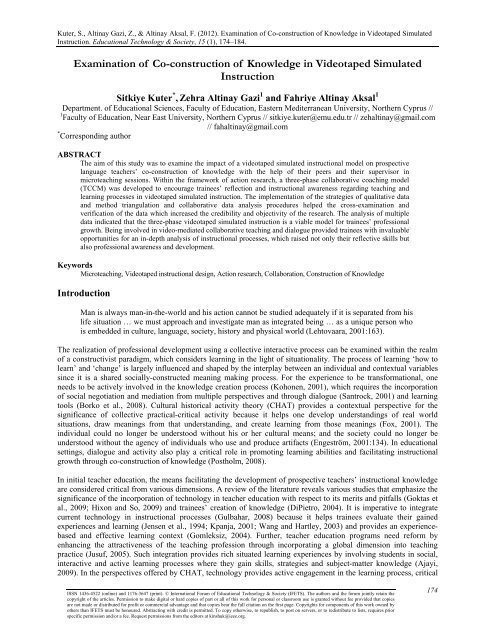January 2012 Volume 15 Number 1 - Educational Technology ...
January 2012 Volume 15 Number 1 - Educational Technology ...
January 2012 Volume 15 Number 1 - Educational Technology ...
Create successful ePaper yourself
Turn your PDF publications into a flip-book with our unique Google optimized e-Paper software.
Kuter, S., Altinay Gazi, Z., & Altinay Aksal, F. (<strong>2012</strong>). Examination of Co-construction of Knowledge in Videotaped Simulated<br />
Instruction. <strong>Educational</strong> <strong>Technology</strong> & Society, <strong>15</strong> (1), 174–184.<br />
Examination of Co-construction of Knowledge in Videotaped Simulated<br />
Instruction<br />
Sitkiye Kuter * , Zehra Altinay Gazi 1 and Fahriye Altinay Aksal 1<br />
Department. of <strong>Educational</strong> Sciences, Faculty of Education, Eastern Mediterranean University, Northern Cyprus //<br />
1 Faculty of Education, Near East University, Northern Cyprus // sitkiye.kuter@emu.edu.tr // zehaltinay@gmail.com<br />
// fahaltinay@gmail.com<br />
* Corresponding author<br />
ABSTRACT<br />
The aim of this study was to examine the impact of a videotaped simulated instructional model on prospective<br />
language teachers’ co-construction of knowledge with the help of their peers and their supervisor in<br />
microteaching sessions. Within the framework of action research, a three-phase collaborative coaching model<br />
(TCCM) was developed to encourage trainees’ reflection and instructional awareness regarding teaching and<br />
learning processes in videotaped simulated instruction. The implementation of the strategies of qualitative data<br />
and method triangulation and collaborative data analysis procedures helped the cross-examination and<br />
verification of the data which increased the credibility and objectivity of the research. The analysis of multiple<br />
data indicated that the three-phase videotaped simulated instruction is a viable model for trainees’ professional<br />
growth. Being involved in video-mediated collaborative teaching and dialogue provided trainees with invaluable<br />
opportunities for an in-depth analysis of instructional processes, which raised not only their reflective skills but<br />
also professional awareness and development.<br />
Keywords<br />
Microteaching, Videotaped instructional design, Action research, Collaboration, Construction of Knowledge<br />
Introduction<br />
Man is always man-in-the-world and his action cannot be studied adequately if it is separated from his<br />
life situation … we must approach and investigate man as integrated being … as a unique person who<br />
is embedded in culture, language, society, history and physical world (Lehtovaara, 2001:163).<br />
The realization of professional development using a collective interactive process can be examined within the realm<br />
of a constructivist paradigm, which considers learning in the light of situationality. The process of learning ‘how to<br />
learn’ and ‘change’ is largely influenced and shaped by the interplay between an individual and contextual variables<br />
since it is a shared socially-constructed meaning making process. For the experience to be transformational, one<br />
needs to be actively involved in the knowledge creation process (Kohonen, 2001), which requires the incorporation<br />
of social negotiation and mediation from multiple perspectives and through dialogue (Santrock, 2001) and learning<br />
tools (Borko et al., 2008). Cultural historical activity theory (CHAT) provides a contextual perspective for the<br />
significance of collective practical-critical activity because it helps one develop understandings of real world<br />
situations, draw meanings from that understanding, and create learning from those meanings (Fox, 2001). The<br />
individual could no longer be understood without his or her cultural means; and the society could no longer be<br />
understood without the agency of individuals who use and produce artifacts (Engeström, 2001:134). In educational<br />
settings, dialogue and activity also play a critical role in promoting learning abilities and facilitating instructional<br />
growth through co-construction of knowledge (Postholm, 2008).<br />
In initial teacher education, the means facilitating the development of prospective teachers’ instructional knowledge<br />
are considered critical from various dimensions. A review of the literature reveals various studies that emphasize the<br />
significance of the incorporation of technology in teacher education with respect to its merits and pitfalls (Goktas et<br />
al., 2009; Hixon and So, 2009) and trainees’ creation of knowledge (DiPietro, 2004). It is imperative to integrate<br />
current technology in instructional processes (Gulbahar, 2008) because it helps trainees evaluate their gained<br />
experiences and learning (Jensen et al., 1994; Kpanja, 2001; Wang and Hartley, 2003) and provides an experiencebased<br />
and effective learning context (Gomleksiz, 2004). Further, teacher education programs need reform by<br />
enhancing the attractiveness of the teaching profession through incorporating a global dimension into teaching<br />
practice (Jusuf, 2005). Such integration provides rich situated learning experiences by involving students in social,<br />
interactive and active learning processes where they gain skills, strategies and subject-matter knowledge (Ajayi,<br />
2009). In the perspectives offered by CHAT, technology provides active engagement in the learning process, critical<br />
ISSN 1436-4522 (online) and 1176-3647 (print). © International Forum of <strong>Educational</strong> <strong>Technology</strong> & Society (IFETS). The authors and the forum jointly retain the<br />
copyright of the articles. Permission to make digital or hard copies of part or all of this work for personal or classroom use is granted without fee provided that copies<br />
are not made or distributed for profit or commercial advantage and that copies bear the full citation on the first page. Copyrights for components of this work owned by<br />
others than IFETS must be honoured. Abstracting with credit is permitted. To copy otherwise, to republish, to post on servers, or to redistribute to lists, requires prior<br />
specific permission and/or a fee. Request permissions from the editors at kinshuk@ieee.org.<br />
174

















